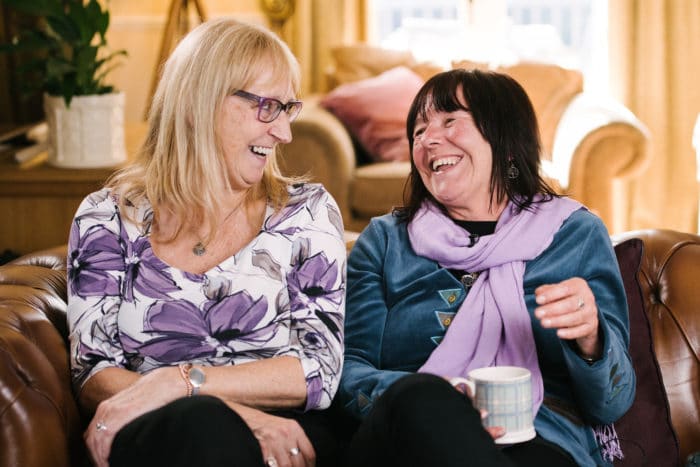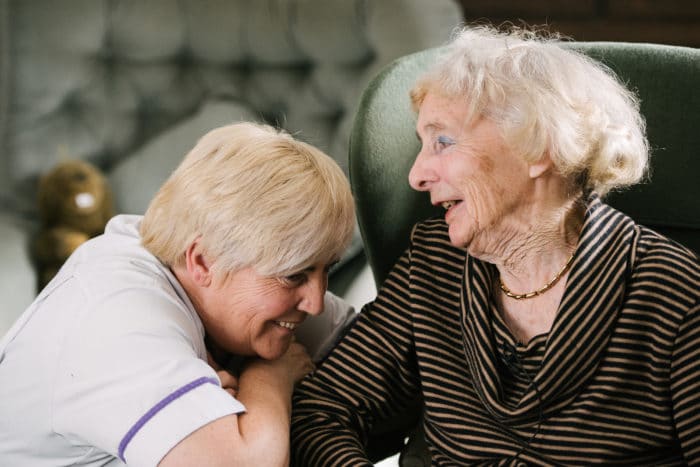Become a helping hand for those who need it most
Has your employment been affected by the recent coronavirus outbreak? If you’ve recently had your hours reduced or have been let go by your employer due to the current climate, we have lots of opportunities at Helping Hands to allow you to offer support to the most vulnerable members of your community, and earn some more financial stability along the way.
We’re always looking for compassionate, dedicated people to join our growing team of private carers, but we have a growing number of customers who need more support than ever to remain safe and independent at home – and that’s where you come in.
We have a range of visiting and live-in care roles available so that you can do your bit to support those who are most vulnerable during the coronavirus outbreak, whilst earning an income for you and your family.
Apply now
Can I work on furlough?
With the recent change in the Coronavirus Job Retention Scheme, you are now able to work in the social care sector if you have been furloughed by your main employer. This means that you could become a Helping Hands carer and still receive pay from your existing employment (dependent upon the contract you have with your main employer), whilst also being paid to care for those in your local community.
Not only are you able to fill your time with working instead of staying at home, but you will also become part of a vital workforce that is protecting our must vulnerable during the coronavirus pandemic.
Becoming a live-in carer
As a live-in carer, you will live with the customer in their home to ensure that they have the constant support they need to live safely and independently in their own home.

What are the benefits of becoming a live-in carer?
- Flexibility – Subject to our customers’ needs, you have the freedom to choose your own work pattern and enjoy time off between placements
- Competitive salary – You will earn up to £580 per week
- Minimal outgoings – You receive free accommodation and a food allowance of up to £35 per week
- Ongoing support – As a valued member of our team, you’ll receive 24-hour support from your local manager
What are the responsibilities of a live-in carer?
- Companionship – Perhaps the most important of all your responsibilities, you will be a friendly face for your customer to share conversation and enjoy spending time with
- Mobility support – Some customers need assistance getting up and moving around their home
- Overseeing medication – All in accordance with the customer’s support plan
- Household chores – Helping out around the home, such as vacuuming or washing clothes
- Running errands – Picking up groceries or prescriptions
- Personal care – Some customers need support with bathing, dressing and continence care
- Other medical support – Extra training is provided for more complex support needs as well as first aid training if this is something you would like to do
“My customers make my life have meaning and purpose again” – Read live-in carer Angela’s story here
Becoming a visiting carer
As a visiting carer, you will play a vital role in the lives of our customers – especially during these uncertain times.

What are the benefits of becoming a visiting carer?
- Competitive rate of pay – Your hourly rate will be from £10 per hour
- Flexibility – You choose your own work patterns
- Mileage allowance – Receive 19p per mile whilst travelling to your care calls
- Free uniform – We’ll provide everything you need to start work straight away
- Ongoing support – As a valued member of our team, you’ll receive 24-hour support from your local manager
What are the responsibilities of a visiting carer?
- Companionship – Providing company for your customers and treating them with dignity, patience and compassion at all times
- Medication support – With appropriate training first and based on the customer’s support plan
- Household chores – Helping with tasks around the home, such as vacuuming, meal preparation and laundry
- Running errands – Collecting groceries and medication
- Personal care – Some customers need support with getting in and out of bed, washing, dressing and continence care
Do I need experience to become a carer?
Taking your first steps in care couldn’t be easier. You don’t need to have a background in care as we provide all the training and support you need to become a fantastic carer. If you are a kind and compassionate person who is looking to make a difference, we’d love to have you on board.
How do I apply?
Follow these easy steps to becoming a care assistant with Helping Hands. With jobs available throughout England and Wales, we’re always on the lookout for more caring stars to join our team.

Step 1: Application
If you’d like to apply, you can do so here. Once you have applied for a role, you will hear from a member of our local branch or live-in care team. The first contact made will be by telephone, so please ensure your contact details are correct when you apply. If we miss you, we will send you an email to let you know we’ve tried to contact you.

Step 2: Getting to know you
When we contact you following tour application, we’d like to have a quick chat with you on the phone. That way, we can really get to know you and ensure that you genuinely share our values.

Step 3: Skype interview
We’d love to meet you face-to-face, however during the coronavirus outbreak we will be conducting all interviews via Skype, Facetime or telephone.

Step 4: Screening process
Due to the nature of our work, we do require all our employees to hold a current DBS certificate. This can take up to four weeks, however we are able to access a substitute check. This allows you to begin employment sooner, but it does limit your responsibilities within the home until your final check comes through.
We will need three forms of ID to process your DBS check:
- Passport or birth certificate
- Proof of address (this must be in the last three months and the address must match another form of ID)
- Driving licence
- Visa or work permit
We will also need:
- An employment reference from your current employer
- A character reference from somebody you have known for more than two years, but is not related to you

Step 5: Assessment and Selection
You will be contacted by our team of assessors to book in a face-to-face chat via Microsoft Teams. Your assessor will then send your assessment paperwork directly to you or to your local branch, and you will complete the paperwork with the support of your assessor.
You will then complete a Skype call with your local care manager where you will be taken through practical sessions on our moving and handling module. This module must be completed within seven days of your Skype call.
Your local care manager will then arrange for you to shadow an existing carer where you will complete a moving and handling task. The carer will then report back to your local care manager with a summary of your call.

Step 6: Begin your role
Providing you have successfully completed the Assessment and Selection course and your DBS checks are complete, you can start your work as a care assistant.
Visiting carers – you will have the opportunity to work alongside an experienced carer until you feel confident in the community to continue on your own.
Live-in carer – once you have completed your training, you will be placed with a customer and begin caring for them in their home.
Apply now